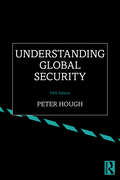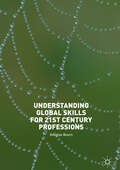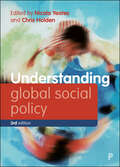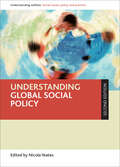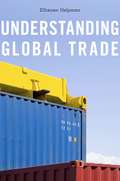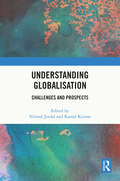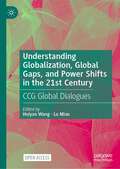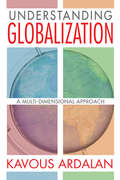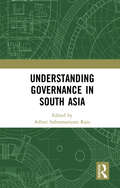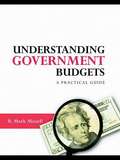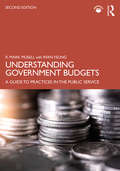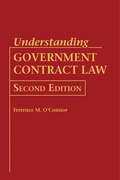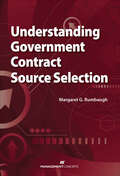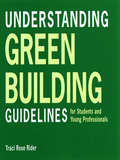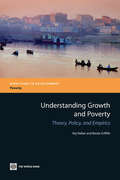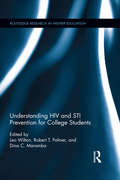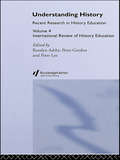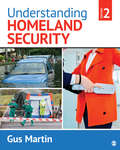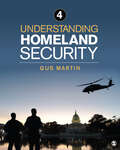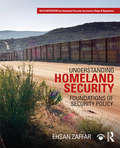- Table View
- List View
Understanding Global Security
by Peter HoughFully revised and updated, this fifth edition of Understanding Global Security considers the variety of ways in which peoples’ lives are threatened and / or secured in contemporary global politics. The traditional focus of security studies - war, deterrence and terrorism - are analyzed alongside non-military security issues such as famine, crime, disease, disasters, environmental degradation and human rights abuses to provide a comprehensive survey of how and why people are killed in the contemporary world. Key concepts of International Relations and globalization are defined and explained, prominent political thinkers and activists are profiled in short biographies and the human impact of the various security threats considered graphically illustrated in ‘top ten’ tables. Hence, this textbook introduces students to the full range of security issues in a clear and concise format that is easy to follow. Specific updates include: A refresh of the evolving theoretical literature on security including more analysis of feminist and post-colonial thought. Key recent international political developments- such as the Covid-19 pandemic, the war in Ukraine and the withdrawal of the US from Afghanistan - are appraised and incorporated. A new section on hybrid warfare is included in Chapter 2, misogynistic terror is profiled in Chapter 3, whilst gun-smuggling and cybercrime are considered in more depth in Chapter 10. Chapter 5 features analysis of the rise of ‘genocide diplomacy’. The rise of private legal challenges to governments for failing to implement commitments to the Paris 2015 Climate Change Accords is reviewed and analysed. Greater evaluation of global governance, in the face of populist nationalist challenges to international cooperation, is offered. User-friendly and easy to follow, this textbook is designed to make a complex subject accessible to all. Key features include: ‘Top ten tables’ highlighting the most destructive events or forms of death in those areas throughout history. Boxed descriptions elaborating key concepts in the fields of security and International Relations. ‘Biographical boxes’ of key individuals who have shaped security politics. Further reading and websites at the end of each chapter guiding you towards classic texts and the most up-to-date information on the various topics. Glossary of political terminology. This highly acclaimed and popular academic text will continue to be essential reading for everyone interested in security.
Understanding Global Skills for 21st Century Professions
by Douglas BournThis book highlights the increasing need for people who will be working in professions such as teaching, health, engineering and business management to have the skills for living and working in a global society. Globalisation and the challenges resulting from recent political events in Europe and North America have given rise to a need for training and further and higher education programmes to address the skills young people all need to effectively engage in the current global society. Reviewing the range of theories and debates surrounding skills for the twenty-first century, the author suggests there is a need to directly address the real-world issues of today and move beyond abstract concepts such as team work, critical thinking and problem solving, as important as these concepts are. The author proposes a new framework for global skills using examples from international and national policy-makers and evidence from further and higher educational programmes and training courses. This pioneering yet practical book will be of value to students and scholars of global education as well as practitioners and policy makers.
Understanding Global Social Policy (Understanding Welfare: Social Issues, Policy and Practice)
by Nicola Yeates & Chris HoldenWith a contemporary overview of global social policy formation, the third edition of this leading textbook identifies key issues, debates and priorities for action in social policy across the Global South and North. Accessible and lively, it incorporates seven new chapters covering theory, social justice, climate, migration, gender, young people and water, energy and food. The original chapters have also been fully updated to reflect major developments in the fast-changing world of global social policy. Key features include: • overview and summary boxes to bookend each chapter; • questions for discussion and follow-up activities; • further reading and resources. Exploring what it means to locate human welfare within a global framework of social policy analysis and action, this textbook offers a perfect guide for curious students.
Understanding Global Social Policy 2e (Understanding Welfare: Social Issues, Policy and Practice)
by Nicola YeatesBuilding on the successes of Understanding Global Social Policy (Yeates ed. 2008) and its companion text, the Global Social Policy Reader (Yeates and Holden ed. 2009), the second edition of this leading textbook in social policy identifies and reviews the key issues, debates and priorities for action in global social policy as a field of academic study and research and as a field of political practice and action. All first edition chapters have been systematically revised and updated to reflect major developments in the fast-paced area of global social policy making over the past five years, and include new material on the Millennium Development Goals, the Social Protection Floor and the ‘greening’ of global social policy. This much-needed second edition includes new chapters on global poverty and inequality, social protection, criminal justice and education. Written by an international team of leading social policy analysts , Understanding Global Social Policy is the leading textbook in the field and provides a comprehensive and accessible overview of international actors and social policy formation in global context. It is essential reading for undergraduate and postgraduate students, researchers, policy makers and practitioners seeking to identify key issues in contemporary social policy and locate them within a global framework of analysis and action.
Understanding Global Trade
by Elhanan Helpman<P><P>Global trade is of vital interest to citizens as well as policymakers, yet it is widely misunderstood. This compact exposition of the market forces underlying international commerce addresses both of these concerned groups, as well as the needs of students and scholars. Although it contains no equations, it is almost mathematical in its elegance, precision, and power of expression. <P><P> Understanding Global Trade provides a thorough explanation of what shapes the international organization of production and distribution and the resulting trade flows. It reviews the evolution of knowledge in this field from Adam Smith to today as a process of theoretical modeling, accumulation of new empirical data, and then revision of analytical frameworks in response to evidence and changing circumstances. It explains the sources of comparative advantage and how they lead countries to specialize in making products which they then sell to other countries. While foreign trade contributes to the overall welfare of a nation, it also creates winners and losers, and Helpman describes mechanisms through which trade affects a country's income distribution. <P><P> The book provides a clear and original account of the revolutions in trade theory of the 1980s and the most recent decade. It shows how scholars shifted the analysis of trade flows from the sectoral level to the business-firm level, to elucidate the growing roles of multinational corporations, offshoring, and outsourcing in the international division of labor. Helpman's explanation of the latest research findings is essential for an understanding of world affairs.
Understanding Global Trade
by Elhanan HelpmanGlobal trade is of vital interest to citizens as well as policymakers, yet it is widely misunderstood. This compact exposition of the market forces underlying international commerce addresses both of these concerned groups, as well as the needs of students and scholars. Although it contains no equations, it is almost mathematical in its elegance, precision, and power of expression. Understanding Global Trade provides a thorough explanation of what shapes the international organization of production and distribution and the resulting trade flows. It reviews the evolution of knowledge in this field from Adam Smith to today as a process of theoretical modeling, accumulation of new empirical data, and then revision of analytical frameworks in response to evidence and changing circumstances. It explains the sources of comparative advantage and how they lead countries to specialize in making products which they then sell to other countries. While foreign trade contributes to the overall welfare of a nation, it also creates winners and losers, and Helpman describes mechanisms through which trade affects a country's income distribution. The book provides a clear and original account of the revolutions in trade theory of the 1980s and the most recent decade. It shows how scholars shifted the analysis of trade flows from the sectoral level to the business-firm level, to elucidate the growing roles of multinational corporations, offshoring, and outsourcing in the international division of labor. Helpman’s explanation of the latest research findings is essential for an understanding of world affairs.
Understanding Globalisation: Challenges and Prospects
by Kamal Kumar Nirmal JindalThe book examines contemporary globalisation, which signifies a growing interconnectedness between people and societies across the world through increasing flows of people, goods, services, finance, and ideas across the borders. The concept of globalisation and its meaning is discussed through insights from scholars such as David Held, Anthony Giddens, David Harvey, Arjun Appadurai, Ulrich Beck, Manuel Castells, Saskia Sassen, and many other scholars to explain divergent perspectives of globalisation. The book also studies threats like nuclear weapons proliferation, global terrorism, environmental security issues, global justice, poverty, migration, and global shifts. It aims to generate readers’ interest in understanding globalisation and analysing the changing dynamics of world politics by studying it from diverse viewpoints. The emergence of COVID-19 and resurgence of great power politics has given rise to the debate of de-globalisation and return of a new kind of ‘cold war’. In this context, this volume will also help readers to understand globalisation in the present changing world order. The book will be useful to the students of political science, international relations, and other interdisciplinary social sciences subjects like political economy and global/international politics.
Understanding Globalization, Global Gaps, and Power Shifts in the 21st Century: CCG Global Dialogues
by Lu Miao Huiyao WangThis book aims to help readers make sense of our changing world by sharing the views of global thought leaders on some of the most important issues of our time, from US-China relations and global governance to climate change and the COVID-19 pandemic. The ten dialogues in this book were part of the “China and the World” series of online discussions hosted by the Center for China and Globalization (CCG). The series features CCG President Huiyao Wang in conversation with experts from a range of fields, from renowned scholars of international relations, economics, and history, to journalists, policymakers, and business leaders. The speakers featured in this book are Graham Allison, David Blair, Kerry Brown, Anne Case, Li Chen, Wendy Cutler, Angus Deaton, Thomas L. Friedman, Valerie Hansen, Pascal Lamy, Kishore Mahbubani, Joseph S. Nye Jr., Adam Posen, J. Stapleton Roy, John L. Thornton, Huiyao Wang, Martin Wolf, and Zhu Guangyao. These wide-ranging discussions offer unique insights and perspectives on key trends shaping our world in the 21st century. These include the rise of China and shifts in geopolitics, as well as the evolving nature of globalization, transnational threats, and multilateralism.This is an open access book.This is an open access book.
Understanding Globalization: A Multi-Dimensional Approach
by Kavous ArdalanThis book discusses eight dimensions of globalization—world order, culture, the state, information technology, economics, production, development, and Bretton Woods Institutions—from the perspective of four diverse sociological paradigms: functionalist, interpretive, radical humanist, and radical structuralist. This multi-perspective approach forces readers to abandon their preconcieved assumptions and allows them the opportunity to view globalization through new eyes.Kavous Ardalan argues that social theory can usefully be conceived in terms of these four key paradigms because each one is founded upon different assumptions about the nature of social science and each one generates useful theories, concepts, and analytical tools. This method facilitates distancing from one's favored paradigm and appreciating other available approaches to better understand social phenomena. The knowledge of paradigms increases awareness of the boundaries and limitations of each individual paradigm. While most books on the topic focus on particular aspects of globalization from specific viewpoints, this fair and unbiased volume provides readers with a balanced understanding of globalization.
Understanding Governance in South Asia
by Adluri Subramanyam RajuThe concept of good governance in South Asia poses a challenge at the implementation level, mainly due to ethnocentricity, regional disparities, division between poor and rich, and rural and urban division among the people. Concepts such as decentralization, citizen engagement, lean public service, privatization, autonomy, public-private partnership may work well in developed countries but may not produce the same results in the region where the majority of poor people expect their government to fulfill their basic needs.Governance in South Asia needs to be reformed to ensure that poverty can be reduced, if not completely eradicated. Poor governance and the various means by which governance has fallen short, has led to lack of development and continuance of poverty in South Asian societies. South Asian countries have more or less similar objectives, structures, value systems, cultures, and standards of governance despite different forms of government. The colonial legacy of British administrative system had its impact on centralization. Secrecy, elitism, rigidity, and social isolation is common to all South Asian countries. The post-colonial administrative system is built upon pre-colonial administrative traditions throughout the region. These countries can learn from each other’s experiences. They need to develop an indigenous model to find pragmatic solutions to the challenges of good governance. This book argues that countries in South Asian can achieve good results through good governance if they develop and adopt an indigenous model rather than simply borrowing models and ideas from the West. Please note: This title is co-published with Manohar Publishers, New Delhi. Taylor & Francis does not sell or distribute the Hardback in India, Pakistan, Nepal, Bhutan, Bangladesh and Sri Lanka.
Understanding Government Budgets
by R. Mark MusellBudgets in the United States follow rules of presentation and use terms that make sense to few outside the world of government finance. Moreover, practices vary widely among the thousands of governments in the country, between federal, state, and local levels. Understanding Government Budgets offers detailed explanations of each of the different types of information found in budgets, featuring annotated examples from both state and local budgets, as well as the budget of the federal government. It stresses that the choices made about format and organization influence the story a budget tells about government. The goal of the book is to make the format of budgets and the information they contain accessible and understandable, helping users make better sense of government and its performance. Perfect for undergraduate or graduate level courses in budgeting and public administration, Understanding Government Budgets also makes a useful guide to budgets for the average citizen with an interest in how government operates or journalists writing about it.
Understanding Government Budgets: A Practical Guide
by R. Mark Musell Ryan YeungPublic budgets follow rules of presentation and use terms that make sense to few outside the world of public finance. Moreover, practices vary widely among the thousands of governments across the globe, between federal, state, and local levels of government in the U.S., and among non-profit organizations, many of which provide services similar to governments. Understanding Government Budgets, Second Edition offers a detailed examination of each of the different types of information found in budgets, featuring annotated examples from a variety of organizations. It expands on explanations in the previous edition by including a wealth of examples from governments abroad and from the non-profit sector. The book stresses that the choices made about content, format, and organization influence the story a budget tells. Designed to help citizens, students, and policy makers become more informed users of public budgets, this book makes the format of budgets and the information they contain accessible and understandable, providing users with the tools they need to make better sense of public organizations and their performance. Perfect for undergraduate or graduate level courses in budgeting and public administration, Understanding Government Budgets, Second Edition also offers a useful guide to budgets for the average citizen with an interest in how government operates.
Understanding Government Contract Law
by Terrence M. O'ConnorThis updated classic offers clear and concise explanations of the basic legal concepts of government contract law for professionals at any stage of their career. Written in straightforward language for contracting officers, contract administrators, contractors, subcontractors, and others in the procurement field, this new edition has been updated with new cases and regulations. The book breaks down the complex arena of government contract law into its three most basic parts: the contracting parties, the contract itself, and legal challenges. It begins by examining key aspects of the contracting officer's job and provides guidance for navigating its different and often conflicting demands. The government contractor's responsibilities and challenges are also outlined. Government contracts come in a lot more varieties than the typical commercial contract, and they also tend to be long and confusing. The second part of the book introduces the different types of legal agreements the government uses to buy the goods and services it needs—and addresses the challenges of writing a perfectly clear contract and guidelines for interpreting an ambiguous one. The book concludes with an overview of the government contract litigation process.This is an essential text for students preparing to do the work of government contracts, an indispensable guide for those new to the work, and a valuable reference for contracting personnel who seek solutions to specific issues they face in their day-to-day work.
Understanding Government Contract Law
by Terrence M. O'ConnorA "back-to-basics" guide to government contract lawFinally! A plain-English presentation of the basic legal concepts of government contract law for professionals at any stage in their careers.Until now, anyone in the procurement field has had to trudge through dense and complex texts written in hard-to-follow "legalese" in their quest to understand procurement law. With Understanding Government Contract Law, they finally have a source of clear and concise explanations of the legal principles involved in government contract law, written by an authority on the subject.Part I of the book focuses on the unique problems facing each of the parties to a government contract – the contract officer and the contractor – and offers insight to the many roles played by the contract officer in the procurement process. Part II describes why and how the government contract is different from commercial contracts. Part III explores the ins and outs of a government contract lawsuit.The author presents key legal principles of government contract law by:• Stating a legal principle• Specifying where in the Federal Acquisition Regulation (FAR) that principle is found• Offering the rationale, context, and any public policy behind the principle• Describing, with case law examples, situations where the government applied the law correctly and situations where the government came to that conclusion incorrectly
Understanding Government Contract Source Selection: The 9 Behaviors of Great Problem Solvers
by Margaret G RumbaughYour Go-to Resource for Government Contract Source Selection!From planning to protest and all the steps in between, Understanding Government Contract Source Selection is the one reference all government acquisition professionals and contractors should keep close at hand. This valuable resource provides straightforward guidance to ensure you develop a firm foundation in government contract source selection.Government acquisition professionals can reference this book for guidance on:• Preparing the acquisition and source selection plans• Drafting evaluation criteria and proposal preparation instructions• Creating a scoring plan and rating method• Drafting the RFP and SOW• Conducting a pre-proposal conference• Preparing to receive proposals and training evaluators• Evaluating technical, management, and cost proposals• Avoiding protestContractors can reference this book for guidance on:• Selling to the federal government• Reviewing a draft RFP and providing comments• Participating in a pre-proposal conference• Preparing a proposal that complies with RFP requirements• Developing a strategy for teaming agreements, subcontracts, and key personnel• Negotiating a contract• Getting the most out of post-award debriefings• Filing a protestPLUS! Understanding Government Contract Source Selection provides a source selection glossary, an extensive case study, and sample proposal preparation instructions in the appendices to help you navigate the federal competitive source selection process. This complete guide is an indispensable resource for anyone striving to build their knowledge of government contract source selection!
Understanding Green Building Guidelines: For Students and Young Professionals
by Traci Rose RiderSummarizes the main issues and strategies of the forceful and fast-paced green building movement. Many professions are increasingly producing tools to assist clients in breaking down and understanding the different elements that reside under the umbrella of the sustainability movement. For the design and construction professions, this unpacking often takes the form of green building guidelines and rating systems. This book aims to look at a selection of both national and local green building rating systems and guidelines, ranging from commercial to residential. While the goal is to provide students and young professionals with a solid overview of each product, enabling them to understand the differences and select the most appropriate system for their chosen projects, the book provides valuable overviews and comparisons for anyone interested in better buildings: designers, homeowners, realtors, contractors, facility managers, site designers, and more.
Understanding Growth and Poverty
by Raj Nallari Breda GriffithThe literature on growth and poverty is voluminous and still evolving. This title distills the most important lessons from developing countries' experience with growth and poverty. It provides a broad understanding of the impact of economic policies on growth and poverty reduction in developing countries. After describing basic economic relationships that summarize the workings and the measurement of the macroeconomy--and after confirming that growth is the most critical factor in alleviating poverty--the book turns to individual policy areas. These include the various roles of government, among them setting fiscal policy and maintaining an environment conducive to the effective operation of a market economy. Policies governing money supply, exchange rates, and the financial sector are also covered. After assessing several decades of experience with development assistance, the aim of which has been to place poor countries on a path of sustainable long-run growth, the study turns to a discussion of external debt. In the 1980s and 1990s, debt contracted by low-income countries from commercial and official sources became unsustainable, crippling their growth, keeping millions in poverty, and forcing an international reappraisal of lending policies, the centerpiece of which was a set of debt-forgiveness policies that was put forward with the launch of the Jubilee 2000 debt relief campaign. The remainder of the volume examines problems that can keep the poor from moving out of poverty. Trade, institutional development, regulation, education, health, labor markets, land and agriculture, natural resources, urbanization, technology, and politics-all are core components of public policy and need to be handled right if poverty is to be addressed effectively. Because many developing countries lack the capacity to mobilize resources-administrative and financial-to move the poor out of poverty, the international community must be actively involved. Looking ahead, rates of growth and poverty will be determined by how nations use knowledge, technology, and energy in firms and households, and by the effects of the warming climate on economic activities. Above all, the distribution of political and economic power within and among countries will determine the direction and dynamics of growth and development.
Understanding HIV and STI Prevention for College Students (Routledge Research in Higher Education)
by Dina C. Maramba Leo Wilton Robert T. PalmerAccording to the Centers for Disease Control and Prevention, young people aged 18 to 25 are at a significant risk for acquiring and transmitting HIV (Human Immunodeficiency Virus) and other STIs (sexually transmitted infections). Primary developmental processes that place college students particularly at risk include the experience of intimacy, sexual desires and the centrality of the peer group. During these routine developmental processes, college students experiment with unprotected sex, multiple sex partners and alcohol and illicit drugs, all of which are contributing risk factors for HIV/STI infections. Early diagnosis, treatment and prevention of HIV and other STIs is germane to promoting the sexual health of college students and reducing high HIV/STI infection rates among young people. This edited volume will provide innovative and cutting-edge approaches to prevention for college students and will have a major impact on advancing the interdisciplinary fields of higher education and public health. It will explore core ideas such as hooking up culture, sexual violence, LGBT and students of color, as well as HIV and STI prevention in community colleges, rural colleges and minority serving institutions.
Understanding Health Policy: A Clinical Approach
by Thomas Bodenheimer Kevin GrumbachUnderstand how the healthcare system works - and how you can succeed in it Covers the 2010 Affordable Care Act A Doody's Core Title for 2015! The most trusted and comprehensive guide to healthcare available, Understanding Health Policy provides everything students and professionals need to build a solid foundation on the field's most critical issues. Expert practitioners in both the public and private healthcare sectors, the authors cover the entire scope of our healthcare system--from the concepts behind policy decisions to concrete examples of how they affect patients and professionals alike. Understanding Health Policy, 6e makes otherwise difficult concepts easy to understand--so you can make better decisions, improve outcomes, and enact positive change on a daily basis. Features: Coverage of structure, organization, and financing of the health care system Key principles, descriptions, and concrete examples are skillfully interwoven in each chapter to make important issues interesting and understandable Clinical vignettes clarify difficult concepts and demonstrate how they apply to real-world situations Comprehensive list of review questions reinforce what you have learned Understanding Health Policy, 6e will help you develop a clearer, more systematic way of thinking about health care in the United States, its problems, and the alternatives for managing and solving these problems.
Understanding History: International Review of History Education 4 (Woburn Education Series)
by Peter Lee Peter Gordon Rosalyn AshbyWhat sense do children and young people make of history? How do they cope with competing historical accounts in textbooks? How do they think historical or archaeological claims are supported or rejected? And whatever students think about history, how do their teachers see history education? The contributors to this fourth volume of the International Review of History Education discuss these questions in the context of their research. Divided into two sections, the first part of the book examines students' ideas about the discipline of history and the knowledge it produces. The second part looks in detail at teachers' own ideas about teaching. Featuring contributions from authors throughout the world, including the USA, Canada, Portugal, Brazil, Taiwan and the UK, the book provides interesting studies of how history is both taught and received in these different countries.Understanding History contributes to current knowledge of successful teaching: that teachers must take into accounts students' preconceptions that they bring to the classroom as well as accepting the complexity and importance of their own professional knowledge. The book will be of interest to anyone studying or researching history education as well as teachers of history throughout the world.
Understanding Homeland Security
by Dr Gus MartinDr. Gus Martin’s Understanding Homeland Security, Second Edition is a thoroughly updated textbook offering much-needed insight into the complex nature of issues addressed by the homeland security enterprise. This comprehensive textbook addresses such subject areas as emergency management, terrorism, criminal justice administration, intelligence, armed conflict, and social environments. Martin’s pedagogical approach is designed to stimulate critical thinking in readers, allowing them to not only comprehend the fundamentals, but also evolve with the very dynamic nature of homeland security. The Second Edition introduces readers to homeland security in the modern era, focusing particularly on the post–September 11, 2001 world. Reviewing theories, agency missions, laws and regulations governing the homeland security enterprise, this book keeps readers on the forefront of homeland security.
Understanding Homeland Security
by Gus MartinDr. Gus Martin’s Understanding Homeland Security, Second Edition is a thoroughly updated textbook offering much-needed insight into the complex nature of issues addressed by the homeland security enterprise. This comprehensive textbook addresses such subject areas as emergency management, terrorism, criminal justice administration, intelligence, armed conflict, and social environments. Martin’s pedagogical approach is designed to stimulate critical thinking in readers, allowing them to not only comprehend the fundamentals, but also evolve with the very dynamic nature of homeland security. The Second Edition introduces readers to homeland security in the modern era, focusing particularly on the post–September 11, 2001 world. Reviewing theories, agency missions, laws and regulations governing the homeland security enterprise, this book keeps readers on the forefront of homeland security.
Understanding Homeland Security
by Gus MartinGus Martin′s Understanding Homeland Security, 4th edition offers much-needed insight into the complex nature of issues surrounding modern homeland security. This comprehensive textbook examines the theories, agency missions, laws, and regulations governing the homeland security enterprise through the lens of threat scenarios and countermeasures related to terrorism, natural disasters, emergency management, cyber security, and much more. Martin′s pedagogical approach is designed to stimulate critical thinking in readers, allowing them to not only comprehend the fundamentals, but to analyze and respond to various threat environments. The Fourth Edition introduces readers to homeland security in the modern era, focusing particularly on the post - September 11, 2001 world. Exploring cutting-edge topics, this book keeps readers on the forefront of homeland security.
Understanding Homeland Security
by Gus MartinGus Martin′s Understanding Homeland Security, 4th edition offers much-needed insight into the complex nature of issues surrounding modern homeland security. This comprehensive textbook examines the theories, agency missions, laws, and regulations governing the homeland security enterprise through the lens of threat scenarios and countermeasures related to terrorism, natural disasters, emergency management, cyber security, and much more. Martin′s pedagogical approach is designed to stimulate critical thinking in readers, allowing them to not only comprehend the fundamentals, but to analyze and respond to various threat environments. The Fourth Edition introduces readers to homeland security in the modern era, focusing particularly on the post - September 11, 2001 world. Exploring cutting-edge topics, this book keeps readers on the forefront of homeland security.
Understanding Homeland Security: Foundations of Security Policy
by Ehsan ZaffarUnderstanding Homeland Security is a unique textbook on homeland security that blends the latest research from the areas of immigration policy, counterterrorism research, and border security with practical insight from homeland security experts and leaders such as former Secretaries of the Department of Homeland Security Tom Ridge and Janet Napolitano. The textbook also includes: A historical overview of the origins of the homeland security enterprise as well as its post-9/11 transformation and burgeoning maturity as a profession In-depth descriptions of the state, local, and federal government entities, such as the U.S. Department of Homeland Security, that enforce and carry out the nation’s homeland security laws and policies Detailed discussion of relevant, contemporary topics such as asylum and refugee affairs, cybersecurity and hacking, border security, transportation and aviation security, and emergency management policy A chapter on homeland security privacy and civil liberties issues Unique current affairs analysis of controversial topics such as the National Security Agency’s warrantless wiretapping program, Edward Snowden, the 2016 U.S. presidential election, Russian cyberhacking efforts, and Black Lives Matter Advice, guidance, and insight for students through interviews with homeland security leaders as well as terrorism experts such as Bruce Hoffmann and biowarfare specialists such as Dr. Rebecca Katz The target audience for this text is advanced undergraduate or entry-level graduate students in criminology, intelligence analysis, public policy, public affairs, international affairs, or law programs. This textbook meets requirements for entry-level introductory courses in homeland security.
